
The Johannes-R.-Becher-Medaille was a civil decoration of East Germany created in homage to the poet and politician Johannes R. Becher. It was awarded by the Cultural Association of the GDR.

The Johannes-R.-Becher-Medaille was a civil decoration of East Germany created in homage to the poet and politician Johannes R. Becher. It was awarded by the Cultural Association of the GDR.
The medal is made of bronze, with a diameter of four centimetres. [1] and shows on the obverse side a portrait of Johannes R. Becher surrounded by his name written in capital letters. [2]
It rewarded services "for the development of socialist culture in the GDR". [3] It was awarded to individuals and communities from 1961 onwards for achievements in the fields of arts and culture, but also sports and recreation. The Johannes R. Becher Medal had three levels: bronze, silver and gold. [3]
The award ceremony usually took place on 22 May, Johannes R. Becher's birthday. [3]
According to the German article, 171 people are recipients of this medal.
The National Prize of the German Democratic Republic was an award of the German Democratic Republic (GDR) given out in three different classes for scientific, artistic, and other meritorious achievement. With scientific achievements, it was often given to entire research groups rather than individual scientists.
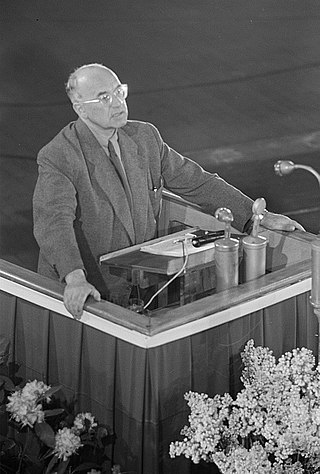
Johannes Robert Becher was a German politician, novelist, and poet. He was affiliated with the Communist Party of Germany (KPD) before World War II. At one time, he was part of the literary avant-garde, writing in an expressionist style.

The Spanish Cross was an award of Nazi Germany given to German troops who participated in the Spanish Civil War, fighting for nationalist general, later Spanish caudillo, Francisco Franco.

The Order of Karl Marx was the most important order in the German Democratic Republic (GDR). The award of the order also included a prize of 20,000 East German marks.
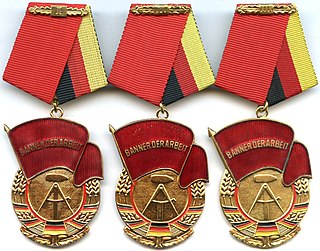
The Banner of Labor was an order issued in the German Democratic Republic (GDR).
The Council of Ministers was the cabinet and executive branch of the German Democratic Republic from November 1950 until the country was reunified on 3 October 1990. Originally formed as a body of 18 members, by 1989 the council consisted of 44 members.

The Distinguished Service Medal of the National People's Army, or "Medal of Merit of the National People's Army", was a medal issued in the German Democratic Republic (GDR).

Following the 1949 establishment of the German Democratic Republic (GDR) the new state prohibited the wearing of all pre-1945 German decorations and created a new system of awards inspired in part by those of the USSR.

The Medal For Faithful Service in the National People’s Army was a medal issued in the German Democratic Republic (GDR).
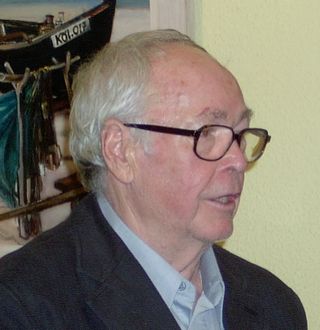
Walter Womacka was a German Socialist Realist artist. His work was pioneering early German Democratic Republic (GDR) aesthetics.

The Scharnhorst Order was the highest medal awarded to members of the East German National People's Army (NVA). It was given for services to military or other strengthening of the German Democratic Republic (GDR). Established on 17 February 1966 by the Council of Ministers of the GDR, it was awarded until the dissolution of the GDR in 1990.

The Medal for Exemplary Border Service was a national award issued in the German Democratic Republic (GDR). It was established on 28 May 1954, by the Council of Ministers of the GDR with Order No. 47/54 from the Ministry of Interior on 16 June 1954. The first presentation ceremony took place on 1 July 1954, to members of the German Border Police.
The Karl-Preusker-Medaille is awarded annually by the German Bibliothek & Information Deutschland on the Day of Libraries in memory of Karl Benjamin Preusker (1786–1871) to people and institutions that effectively promote the cultural mission of the library system.

The Medal for Fighters Against Fascism was an award of the German Democratic Republic given to people who had been active in the German Resistance against Nazism.
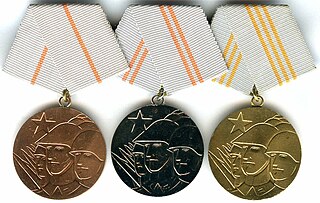
The Medal Brotherhood in Arms of the National People’s Army was a medal issued in the German Democratic Republic (GDR).
Günter Voigt, is a military scientist and retired major general, whose last assignment was as Deputy Commander in Chief and Chief of Staff of the Air Forces of the National People's Army in the former East Germany.
The Johannes Brahms Medal of Hamburg is a music award established in 1928, named after the composer Johannes Brahms who was born in Hamburg.
Lothar Mosler was a mainstream East German historian who arrived at his university career through the political route. Between 1953 and 1961 he served as director of the Franz Mehring Institute for training teachers in Marxist-Leninist Sociological Studies, which was a core base module for students at the Karl Marx University of Leipzig. Between 1958 and his retirement in 1978 Prof. Mosler taught the History of the German Labour Movement at the university.
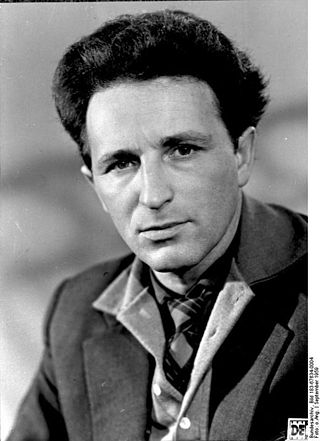
Paul Wiens was a German poet, translator and author of radio plays and screenplays in the German Democratic Republic.

Kurt Walter Barthel, known by his pen name Kuba, was a German writer, poet, playwright, dramaturge and state official.